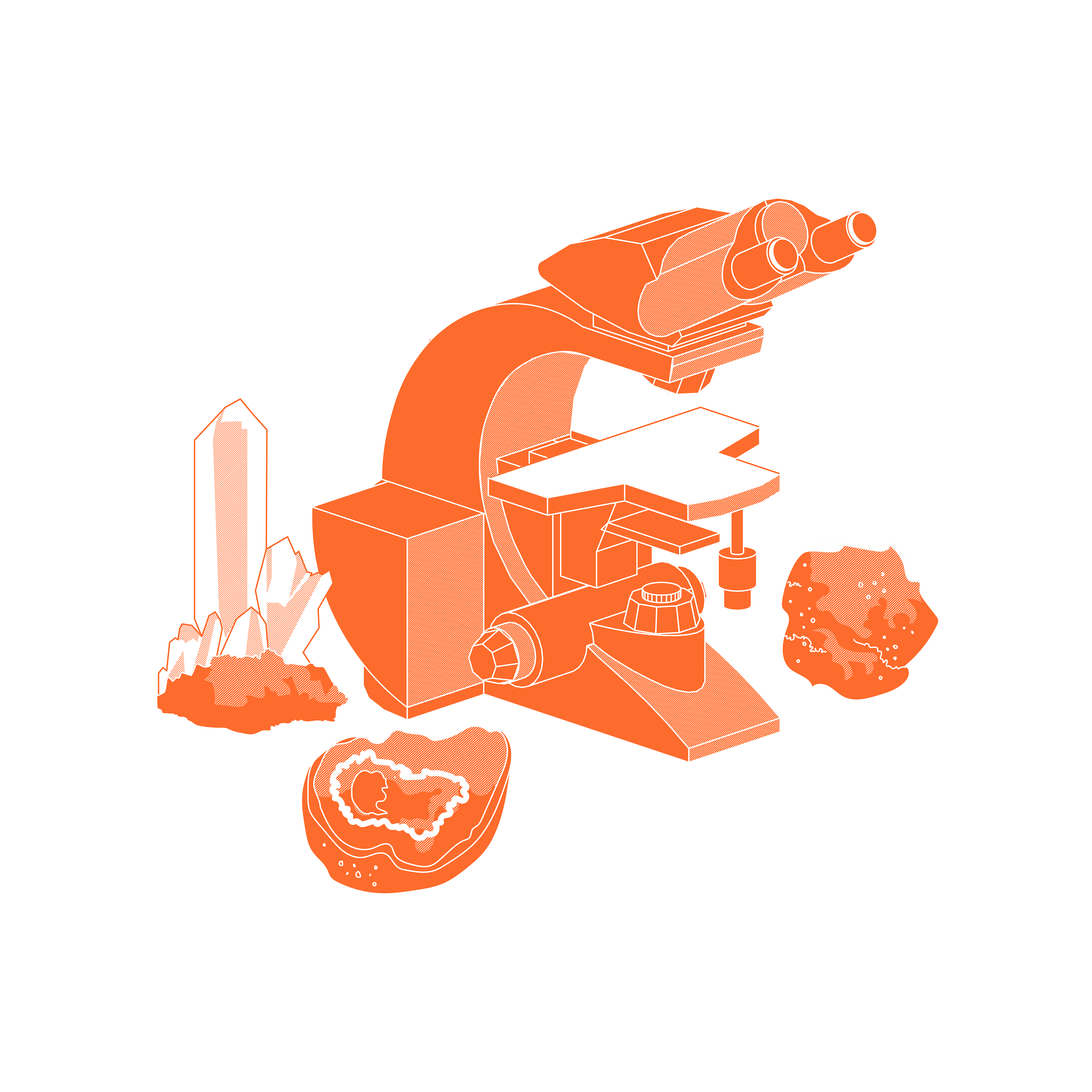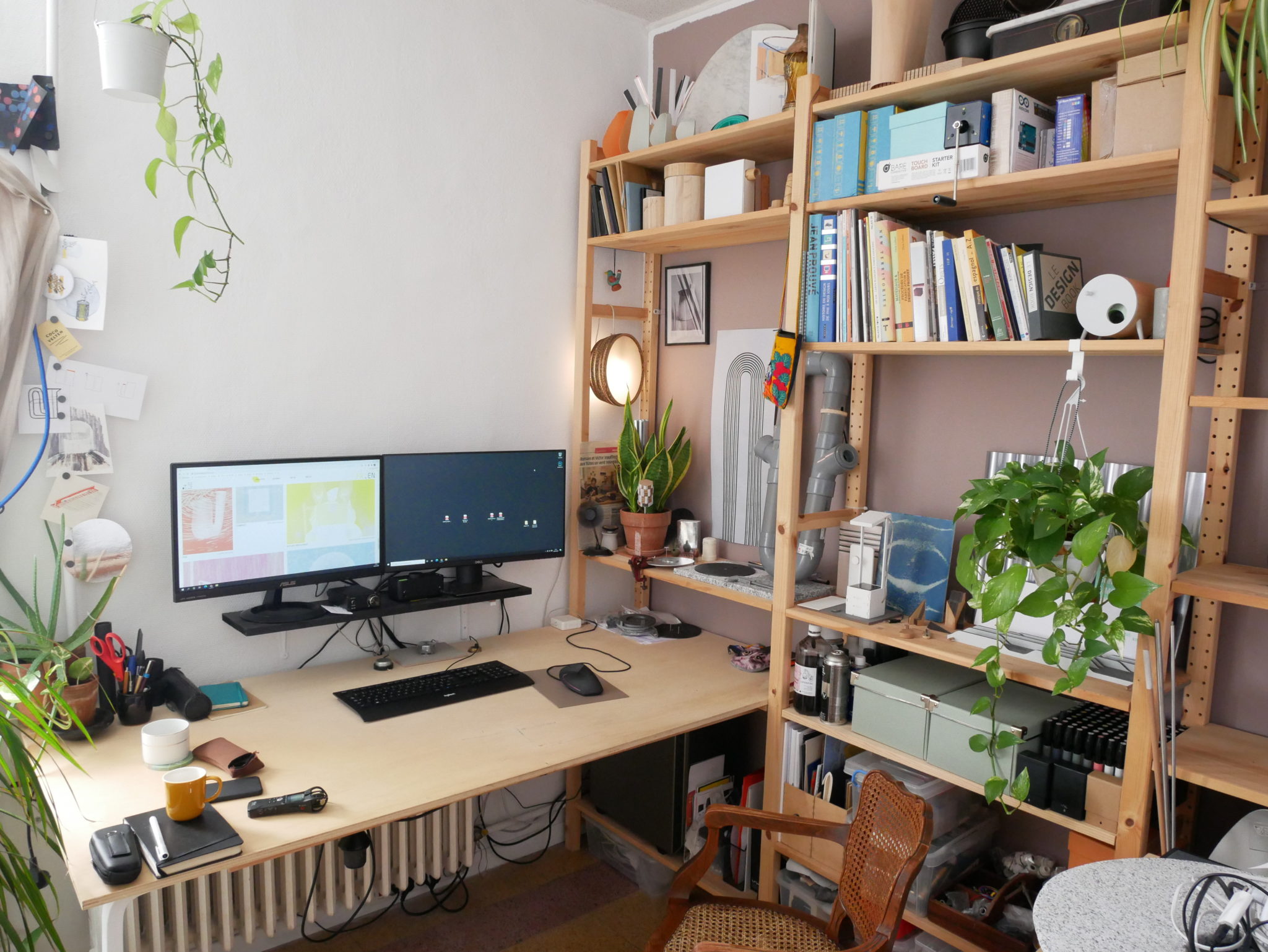Designer

“I studied here [in Marseille] a bit, and then in Paris at École Boulle in space design. And then I moved around […] I did an exchange year in Milan, of one year, where I broadened my understanding of design. And then I scaled down, moved to Lyon and did a short course in product design. […] So, I went from the scale of interior architecture to product design. And this is the aspect I’m interested, playing with scales and transdisciplinary. That’s why I like in this trade.”
- Informal network
- Product / Work mode
- Professional network
“When you’re a product designer, it’s a bit tricky, you’re a bit stuck. When you’re independent and you want to release your things. We design objects, but unless you’re self-producing them, you need to partner with publishing houses [of objects, researcher's note] or art galleries that produce them for you. And on this we get a share, they’re royalties, so it’s 4-5% [of the retail price]. So on this project, we’re two designers, so it goes down to 2% each, so on this water jug that sells for 100€, we get 2€. So it’s nothing. But these projects grant us some exposure. […] But of course, if you’ve designed something that’s successful in the long run that’s great. […] And that’s the kind of objects where you can make money, but later. At the beginning, you don’t make any money, and as you grow, as you make more projects, you earn more royalties and then you’re fine. But that’s kind of a long-term bet. ”
- Contract
- Cost
- Other charges
- Product / Work mode
- Professional network
- Public relation & communication
“My practice as a designer is what I like, but it takes time to develop a practice and earn a living from it. So on the side I do architectural perspectives. I have a friend who has a company in Paris, designing perspectives for architects. […] And sometimes I work as a freelance as a scenographer […] working for retail [and] museums.”
- Contract
- Cost
- Product / Work mode
- Professional network
“That’s what I like being self-employed. You develop a network of friends who do the same thing, who are in the same dynamic. It’s really nice to work with your buddies. And you grow together.”
- Informal network
- Product / Work mode
- Professional network
“We travelled quite a bit with my partner. And then we told ourselves we’re going to get a job [as an employee] in Paris. We had decided to stay 5 years there working for bigger design practices… but we gave up after two years. Just before joining a design office in Paris, I had done an internship in Les Ateliers de Paris, it’s kind of an incubator for designers; they provide studios that are fairly cheap, for Paris that is, and then assist designers in developing their organisations… So I got there, full of freelance designers, and that’s when I realised that it was possible, to develop your own projects, where the initiative comes from you and not a client. So if you go for it, that you believe in it. If you trust what you do, and if it’s pertinent too of course. But if you invest in what you do, you can do it. And that’s something I had not realised before [working there]. ”
- Informal network
- Local community
- Product / Work mode
- Professional network
“My grandad lives in Marseille. […] It was a bit of a bet. My partner is light designer. We need to be in big cities, that have lots to offer. Or at least be in cities that are well connected by trains, and everything. And in Paris I got fed up because of the weather, and the price. You need to earn a lot of money. […] And here in Marseille, my grandad owns a flat that he rents out for his retirement. And the tenant left just when we were asking ourselves questions. And my girlfriend got a job offer here. So it was too good to be true, we just thought we need to give it a go.”
- Informal network
- Local community
- Professional network
- Urban context
“I don’t feel like an artist in the way I work, and my way to be. […] I mean, not in the way a fine artist can be, that would have a studio and who’s compelled to create. […] But on the other hand, in the methodology of my projects it’s quite technical. And that’s where I feel less like an artist. I could work for businesses… that said I’m not a product designer either. But I think I’m close to this… There’s something linked to uses that I really like. That’s a water jug, it’s an everyday object. There’s something anchored [in reality] that you have in design and that you don’t necessarily find in fine arts, which is a bit more trippy. It’s more in the discourse than a direct use.”
- Product / Work mode
“Here it’s more an office to think, and to do small prototypes. So if I want to do some small alterations, cut things, or small models I can. But I can go further. […] There’s no workshop, no big tools here. So it’s more to think, to develop concepts, prototypes. And then go and see people with knowledge, with real know-how. And that’s what I’m interested in too, I don’t see this as a solitary practice. All the projects I’ve done, there couldn’t not have emerged without a discussion, a dialogue. That’s what I find stimulating. Even if you have an idea in your mind, the project will change depending on who you’re partnering with, the artisan.”
- Product / Work mode
- Materials
- Use
“The deal with Coco is to work locally, with the locals. […] And I’d like to, but it’ super complicated. I’ve done it in the past, leading participatory design workshops. […] And I’m often going to work with digital tools, and here in Coco there aren’t any, so it’s a bit difficult. If I do electronics, right away I need material. You need to give all participants the right tools, like a soldering iron, and I don’t have that. Or there’s not enough money for this. […] And obviously I need to earn a living, I’m like everybody always chasing up money, so blocking some time, and money [for the tools and the materials], to do projects with locals. It’s not easy. ”
- Internal structure / Management
- Local community
- Product / Work mode
- Professional network
- Ownership / Management
- Use
“I’m doing a bit of noise […] when I need to fix stuff, or if I want to develop some electronics… I didn’t want to be a nuisance to everyone. And then it’s nice to have your own little cocoon. And I’ve worked in open space before, it’s nice but there’s also some constraints, and here it wasn’t ideal. But the space remains fairly open. ”
- Ecology
- Noise
- Product / Work mode
- Professional network
“There’s a project that got kickstarted at Coco, in relation to the canteen […] and soundproofing the space. So we started to think about devices to diminish the echo there, buffer the sound, with devices that also look nice. We started to think about it together, but then Yes We Camp… [was] in the rush to finish it, and because that’s what they do: architecture, interior design, they took over the process. They proposed something, they had an idea […]. And so in the end, I felt… I went on helping. But I couldn’t, I didn’t feel that I had brought something to Coco, but Coco had come up with its own solution. ”
- Informal network
- Internal structure / Management
- Local community
- Product / Work mode
- Interior modification
- Ownership / Management
“On the other hand what’s really nice, when I really feel part of Coco, is that I’m going to eat at the canteen. I feel part of it as a human, not as a designer. I’m involved because I go and attend the events, in the morning I enter through the canteen, I have my coffee and catch up. This is my way to live in the space. You meet up with people. And then in the evening you can stay, and invite your friends to come over […] for a drink […] or an event. And then there’s other venues like the roof, to eat, where you actually meet other organisations.”
- Informal network
- Local community
- Product / Work mode
- Professional network
- Materials
- Physical accessibility / Location
- Use
- User experience
